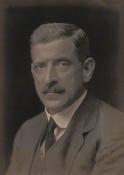
War Memorial
| Henry Roland Murray BOURNE | |
|
Secretary for Defence for South Africa Date of birth: 18th June 1874 Date of death: 8th June 1931 Died aged 56 Unknown |

|
| Henry Roland Murray Bourne was born at Grafton Manor, Bromsgrove in Worcestershire on the 18th of June 1874 the younger son of Lieutenant Colonel Robert Bourne JP DL, Worcestershire Regiment, and Anna Eliza (nee Baker) Bourne of Cowarne Court, Ledbury in Herefordshire. He was christened at Bromsgrove on the 22nd of July 1874. He was educated at Hazelwood School until December 1887. He went on to Radley School where he was in Mr. Evans’ House from January 1888 to July 1893. He was appointed as Head of School and rowed for the First VIII from 1891 to 1893, in the latter year as Captain of the Boats. He distinguished himself at other games, playing for the Football XI in 1892 and representing Radley in the Public Schools fencing competitions at Aldershot where he won the bronze medal for fencing in 1891 and 1892 and for boxing in 1893. He left for New College Oxford in 1893 where he rowed for his college, leaving in 1894. He played cricket for Berkshire where he scored 108 runs against Oxfordshire. He was commissioned as a 2nd Lieutenant in the 4th Battalion King’s Shropshire Light Infantry (Militia) on the 24th of February 1894 and passed first in the Exam for Militia Candidates for the regular army in 1896. He was commissioned as a 2nd Lieutenant in the 1st Battalion Royal Scots (Lothian Regiment) on the 18th of July 1896 and was promoted to Lieutenant on the 21st of February 1898. He served in the South African war from the 6th of November 1899 to 1902 where he was in charge of the Transport Department under General Gatacre and was mentioned in despatches. During the war he was involved in the following action, which was recorded by the school magazine:- “While serving with Rimington’s Scouts in pursuit of Botha’s army last June (1900) (Bourne) found himself alone on top of a Kopje with a huge convoy of Boer wagons and cattle on a neighbouring hill. Without a moment’s hesitation he galloped into the midst of them shouting that the General and four guns were close to them and ordering “Hands up immediately!” One Boer seemed disposed to question the accuracy of this news, but a revolver stuffed into his face furnished sufficient persuasive evidence and he dropped his rifle and the others followed suit and the timely arrival of the Australians resulted in the capture of all but the light cape carts and the mounted men at the head of the convoy.” At the beginning of July 1900 he was dangerously ill with enteric fever but soon recovered and was convalescing by the August. He was promoted to Captain on the 19th of November 1902 and was mentioned in Lord Kitchener’s despatches of the 23rd of June 1902. He was appointed as Repatriation Officer for an area to the north of Pretoria in 1902. He was awarded the King’s Medal with two clasps and the Queen’s Medal with three clasps. He retired from the army on the 27th of June 1906. He was married at the Cathedral in Pretoria to Lucy Dorethea (nee White) on the 11th of September 1906; they had a daughter, Pamela Cristobel, born on the 15th of September 1908. They were divorced in 1922. He was married for a second time to Adeline (nee Waterlow formerly Pearson), an actress, at Capetown on the 23rd of September 1922 by the Magistrate, George J. Boyes. He filed for divorce in London on the 27th of January 1930 on the grounds of her adultery with actor Norman Russell Gregor which was alleged to have taken place at the Bear Hotel, Maidenhead on the 29th and 30th of December 1929. He was granted a decree nisi on the 30th of April 1930. After the war he was seconded to the Transvaal Civil Service on the 24th of June 1902 as a local government auditor and inspector and, in 1905, he was appointed as Under Secretary to the office of the Colonial Secretary of the Transvaal until 1910. He became Under Secretary for the Interior and from 1910 to 1912 and served as Acting Under Secretary in charge of Defence Affairs from 1912 to 1914. In 1914 he was appointed as Secretary for Defence for South Africa and was awarded the CMG on the 3rd of June 1916 and as KBE in 1918 leaving the post in 1922. In December 1922 he paid an unofficial visit to India to study the possibility of settling former army officers and colonial officials in South Africa. As part of his efforts in helping retired civil servants on fixed incomes at home and overseas, and following public support, he formed and became Secretary of the Empire Community Settlement Committee in March 1925. He lived at Stone Cottage, Muckleneuk, Pretoria in the Transvaal and was a member of the Bath Club, the Pretoria Club and the Civil Service Club in Capetown. He retired and returned to London where he lived at 5b Grove End Road, St John’s Wood in London. He died at home in London where he was found by a servant suffering from a gunshot. At an inquest, which was held in Paddington on the 9th of June 1931 it was concluded that he had taken his own life "while of an unsound mind". |
|
| Went on to Radley College |
Back